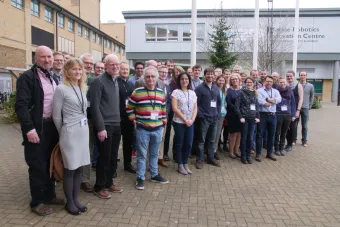
The National Oceanography Centre (NOC) and the University of Exeter have become UK co-hosts for the Ocean Thematic Centre within the Integrated Carbon Observation System (ICOS), a European research infrastructure for measuring greenhouse gases in the atmosphere, land and oceans.
Long-term measurement of the seas is important since the oceans take up about one quarter of the carbon dioxide humans release to the atmosphere, reducing the rate of climate change.
The United Kingdom and Norway will co-host the Ocean Thematic Centre within ICOS, which was previously hosted by NORCE, the Norwegian Research Centre, and the University of Bergen, both in Norway.
ICOS is a research infrastructure measuring greenhouse gases in Europe and the adjacent oceans. These ocean measurements, carried out on commercial and research vessels, and at fixed stations, enable the scientific community to quantify the changing role of the ocean in the global carbon cycle.
The Ocean Thematic Centre supports these measurements through training the station personnel and evaluating new sensors and methodologies. Additional key tasks of the centre include rigorous quality controls in order to ensure the standardised, high-quality of ICOS data. The Ocean Thematic Centre harmonises the observations across Europe, integrating these data with international efforts.
Dr Werner Kutsch, Director General of ICOS, is very positive about this development: “The UK and Norway have a centuries-long history of sea-faring and also deep knowledge in marine research. Pooling their assets will bring forth developments in terms of standardisation, technology and data quality.”
Professor Richard Sanders, who recently moved from UK to Norway to take up the role of Director of the Ocean Thematic Centre, comments: “Obtaining accurate, up to the minute information regarding the ocean carbon sink is key to helping us formulate the policy responses needed to deal with climate change.”
Professor Douglas Connelly from the NOC, adds that research infrastructures bring together scientists working across disciplines and across national boundaries: “We joined ICOS because the greenhouse gas issue is global, and we are delighted to play our part in solving them through research and collaboration. Addressing these big-picture questions demand large-scale, long-term investments, which need to be organized through a solid legal structure. We want to operate together in a joined-up way and deliver solutions for the good of humanity.”
These thoughts are mirrored by Dr Kutsch, who states that research infrastructures are sustainable providers of environmental observations for science and society. “I hope this cooperation will also spread this message even beyond current ICOS countries, to the entire global ocean community.”
In addition to the Ocean Thematic Centre, ICOS has two other thematic centres, concentrating on ecosystem and atmosphere observations, respectively. ICOS also runs two central analytical labs for calibration standards and specific analyses on air samples.